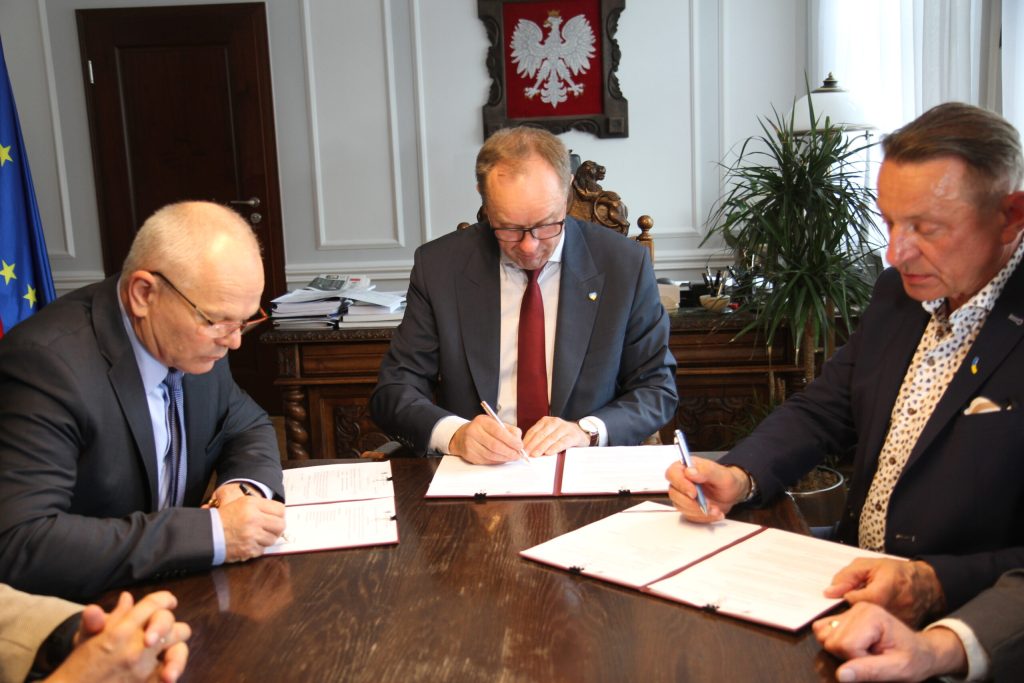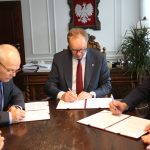 Pomorskie Voivodship and Newag signed a PLN 128 million (EUR 28.5 million) contract for the supply of four electro-diesel Impuls 2 multiple units which will allow easier travel and eliminate transfers between electrified and non-electrified rail routes. PLN 65 million (EUR 14.4 million) will be the co-financing of the contract under Poland’s recovery and resilience plan.
Pomorskie Voivodship and Newag signed a PLN 128 million (EUR 28.5 million) contract for the supply of four electro-diesel Impuls 2 multiple units which will allow easier travel and eliminate transfers between electrified and non-electrified rail routes. PLN 65 million (EUR 14.4 million) will be the co-financing of the contract under Poland’s recovery and resilience plan.
The new hybrid trains will enter passenger services in the second half of 2024. According to the contract, Newag will deliver the first two vehicles within 16 months of signing the contract, and the remaining multiple units, in 17 months.
The agreement was signed on May 15, 2023, by the Marshal of the Pomeranian Voivodeship, Mieczysław Struk and the Deputy Marshal, Leszek Bonna, and the president of Newag, Zbigniew Konieczek.
“It will be much more comfortable, more efficient, but also more beneficial for the environment, because the dual drive means fuel savings and reduction of pollutant emissions,” Mieczysław Struk said.
The electro-diesel Impuls 2 trains will be equipped with air conditioning and will be adapted to the needs of people with disabilities.The safety of the journey will be ensured by a monitoring system. The hybrid trains will provide passengers with free Wi-Fi and on board travel information through a modern dynamic passenger information system. The authorities say that although the contract does not stipulate, the trains will be designed to allow the possibility to install super-capacitors in the future. This will allow trains to use the energy generated during braking when starting from a stop.
The new hybrid trains are intended to be deployed on rail connections from Gdańsk towards Kartuzy, 37 km west from region’s capital and to Kościerzyna, 60 km south-west of Gdańsk as well as on other lines.
At the end of March, Pomorskie Voivodship ordered from Newag 29 Impuls EMUs part of a framework agreement signed in 2022 for two trains. EUR 235.6 million is the total value of the 31 new trains, EUR 147.8 million of which being the European co-financing.
The new electro-diesel Impuls 2 are also expected to operate the 20 km PKM Line (Pomeranian Metropolitan Railway) in Tri-City area, connecting Gdańsk Lech Wałęsa Airport with Wrzeszcz. The authorities will soon complete the electrification of the line which was commissioned in September 2015, consisting of railway lines 248 and 253, and is currently used by 400,000 passengers a month. Recently, testing has been launched for a section of PKM with four electric trains expected to enter operation in June. In the first year of operation (in 2016), PKM Line carried 2 million passengers followed by an increase of 1 additional million passengers in 2017 and in 2018 the ridership reached more than 4 million passengers. In the six years of operation (until 2021), the line has been used by more than 17.5 million passengers.
Part of the PKM project, the operators Polregio and PKP SKM operate four routes with one in Gdańsk agglomeration (the Gdańsk Wrzeszcz – Gdańsk Osowa – Gdynia Główna route) and three regional connections (Gdańsk– Kartuzy; Kościerzyna – Gdańsk – Gdynia and Kościerzyna – Gdańsk Wrzeszcz – Gdynia). The line offers residents of Kartuzy a less than one hour journey to Gdańsk central station and also provides access to other served cities within 30 minutes.
The Pomorska Kolej Metropolitalna company is implementing improvements, including a rail bypass and electrification of the line. In addition, the plans also include the construction of a new branch (PKM Południe – the second phase of the project’s development) which will provide connectivity between the city center of Gdańsk and its southern districts and neighboring communes.
The project covers the construction of a new 7.5 km railway line with 6 stops from the SKM Gdańsk Śródmieście stop through the southern districts of Gdańsk to Kowal where a transport hub will be constructed providing connections to the existing transport modes as well as a three-level car park for 2,100 cars. The project also provides for the possibility of a later connection of the agglomeration section of PKM Południe with both the existing railway line No. 248 (PKM) and the currently closed line No. 229 Pruszcz Gdański – Stara Piła, owned by PKP PLK, which requires modernisation.
When the project is completed, the line will provide a 14-minute travel from Kowal to Gdańsk Główny, three times less than on road transport.
In March, PKM Południe project reached a milestone when the southern districts agreed on the implementation of the project which would take place until 2029 with the support of European co-financing. The authorities plan to submit next year the necessary documentation to obtain European funds. The project will be also financed by the City of Gdańsk with a PLN 28 million (EUR 6.24 million) budget for 2023-2026. With these funds, the documentation work is expected to take 3-4 years and the construction, another 2-3 years. The project is estimated at PLN 1.8 billion (more than EUR 400 million).
Share on:








